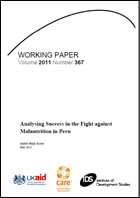‘Making Rights Work for the Poor: Nijera Kori and the Construction of Collective Capabilities in Rural Bangladesh’, IDS Working Paper 200

Whilst there is a formal commitment to rights in Bangladesh, spelt out in its constitution, its legal framework and its ratification of various international conventions on rights, the reality for its citizens is one of violations as much as the observance of rights. For the poor, in particular, who rely for their survival on relationships which position them as dependent on more powerful patrons, there is little prospect of demanding justice. The NGO sector in Bangladesh has sought to compensate for various deficits which characterise the lives of poor and marginalised groups. However, few attempt to directly address the “rights deficit”. One of the few to do so exception is Nijera Kori whose strategy is to build the capacity of the poor to mobilise in defence of their rights and in pursuit of justice. Its focus therefore is on “collective” rather than individual capabilities. The paper concludes by drawing out what Nijera Kori’s experience tells us about processes of social change and its challenge to the linear logic that characterises donor agency approaches to accountability.
[gview file=”http://www.ids.ac.uk/files/Wp200.pdf”]



